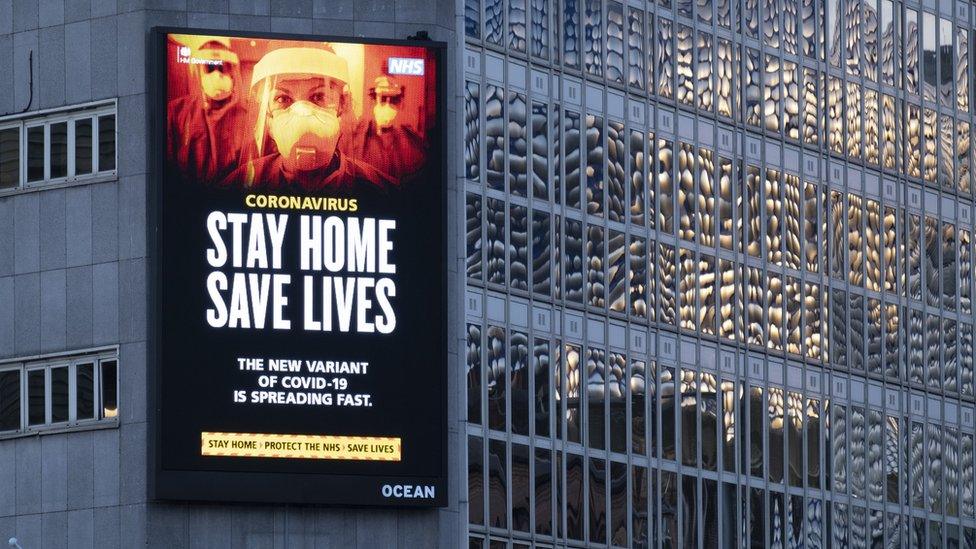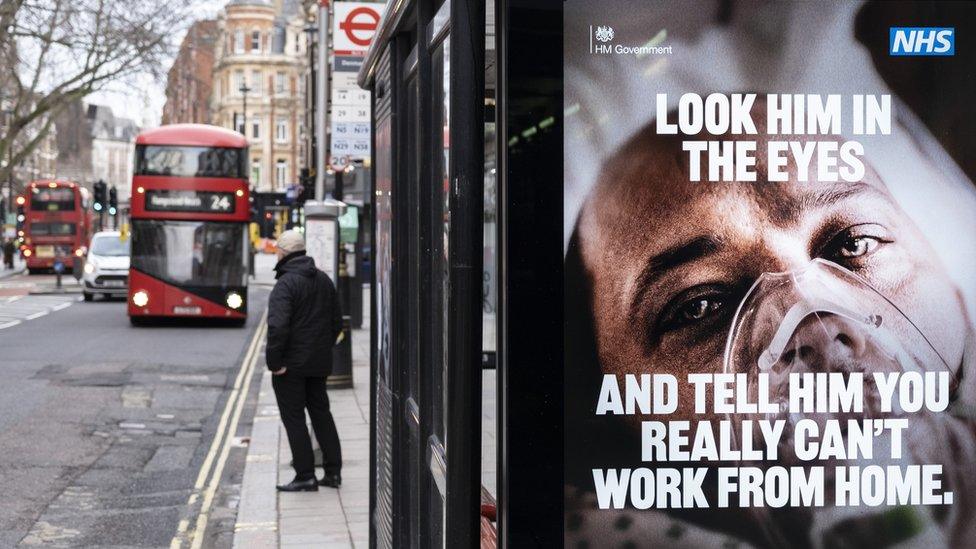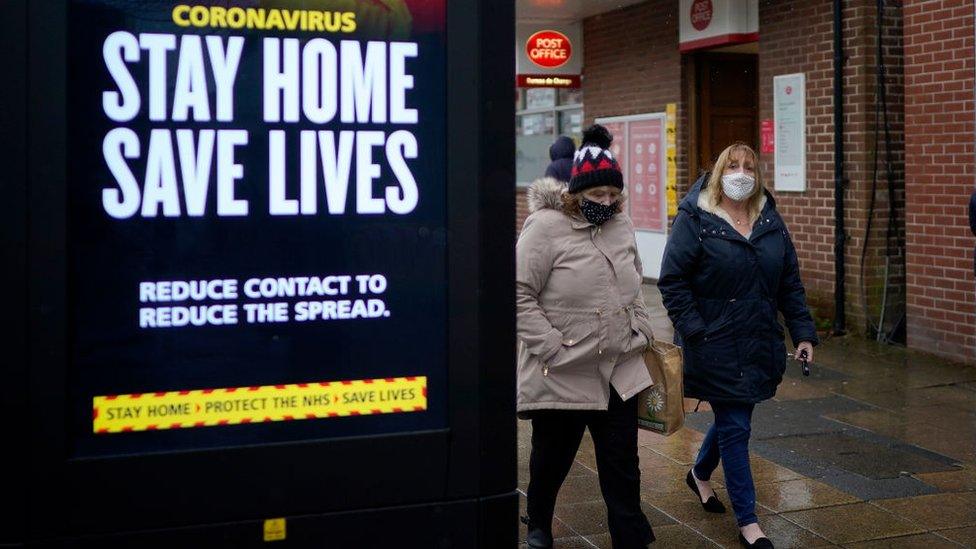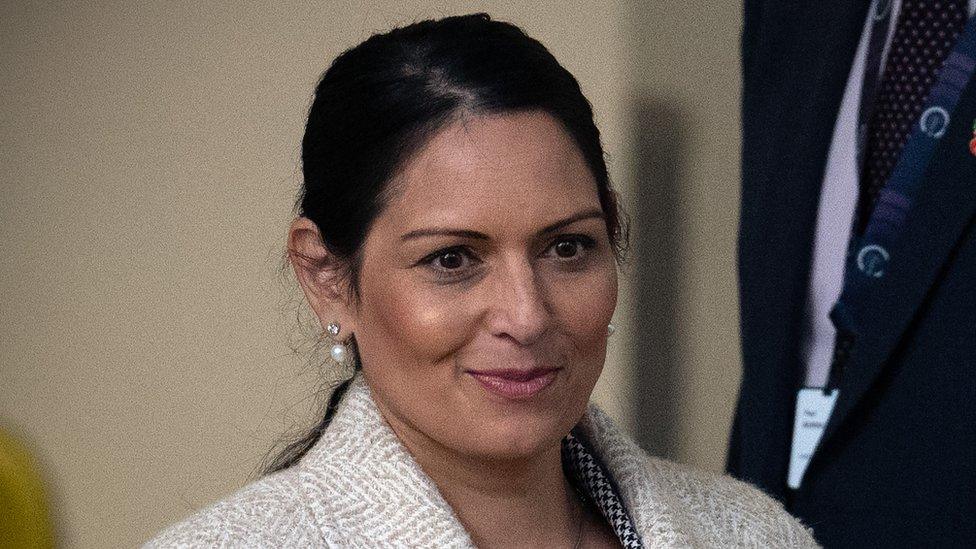Officials urged tough Covid messaging for 'white van man'
- Published

Officials suggested targeting "white van man" with tougher messaging during the pandemic, according to documents published by the Covid inquiry.
The group - along with ethnic minorities and younger people - were among those believed to have a "reduced fear of the virus", an email suggests.
The note, written in July 2020, said government ads should be "much starker" to encourage adherence to Covid rules.
It also suggested that street wardens could monitor compliance.
The recommendations were drawn up by civil servants working for a team in the Cabinet Office in charge of government Covid campaigns.
They are contained in an email thread published by the inquiry, external as part of a huge dump of around 700 documents of evidence this week.
The email, sent to the UK's senior civil servant Simon Case and copied to then-No 10 communications director Lee Cain, contained a note summarising ideas on "Covid communication" drawn up by the Cabinet Office team.
It suggested that the government's "stay alert" slogan, introduced as part of a plan to ease lockdown measures, had been "undermined by the complexity of guidance".
The change in message, introduced in May 2020 to replace "stay at home", was part of a bid to cautiously reopen the economy but was criticised as vague and in conflict with Covid restrictions.
It added that the phrase had also been undermined by "competing messages" and "the near impossibility of acting as the government recommends".
"Our analysis suggests that in the public mind the message has morphed into 'stay safe' but groups of people interpret this in different ways," it added.
It recommended stronger warnings of the "shocking and real" consequences of getting Covid, similar to hard-hitting campaigns in recent years to demonstrate the health dangers of smoking.
It also urged "very specific audience targeting" for "groups who have a reduced fear of the virus".
"We believe that the target audiences for this work include BME [black and minority ethnic] communities, young people who are in contact with older people and 'White Van Man'," it continued.

The government started a hard-hitting ad campaign in early 2021 to back up lockdown rules
The note also suggested various ideas to encourage adherence with Covid rules, including asking the FA to hold a minute's silence ahead of the 2020 FA Cup Final, and a national day to remember those who died of the virus.
It also advocated approaching Netflix and Amazon for help reaching "specific audiences," and the BBC to make "public information films" showing the "risks and consequences of not complying".
"As a last resort we should consider appointing street or local wardens to monitor compliance," it suggested.
The note was forwarded by Mr Case to Simon Ridley, then-head of the Cabinet Office's Covid taskforce, who replied that he agreed with the "thrust" of the suggestions.
However he appears to express some reservations, adding: "I worry whether some of the very stark messaging would scare too many people too much."
He added he favoured abandoning the "stay alert" message as "people don't really know what it means".
The civil servants' suggestions - described as "ideas" - offer an insight into how government grappled with the task of communicating Covid policies to the public, although it is not clear exactly what influence they had on ministers.
Government messaging changed repeatedly throughout the pandemic, with an initial focus on washing hands replaced with simple instructions encouraging people to stay in their homes.
This was relaxed over the summer of 2020 as restrictions were unwound, but as deaths spiralled over the following winter the government launched a series of hard-hitting adverts, external to encourage lockdown compliance.
The campaign featured picture of Covid patients and NHS workers suffering with the disease, and asked people if they could "look them in the eyes" and tell them they are doing all they could to stop the virus spreading.
'Exercise Fairlight'
Documents published by the inquiry also offered an insight into Exercise Fairlight, a little-reported winter planning exercise run over late summer 2020 by the Cabinet Office and the Ministry of Defence.
An undated paper summarising the outcomes of the drill, external warned there would not be enough NHS workers to staff intensive care beds if the government's "reasonable worst case scenario" came to pass.
It also recommended that "simpler and more emotionally compelling" messaging was required to enforce restrictions.
It said those taking part in the exercise felt neither public officials such as the police, nor workers such as shop staff and bus drivers, would "effectively enforce" rules such as mask wearing.
"Public information campaigns (similar to those for drink driving and passive smoking) that create peer pressure to change individual behaviour are critical," it added.
- Published9 January 2021

- Published9 November 2023
